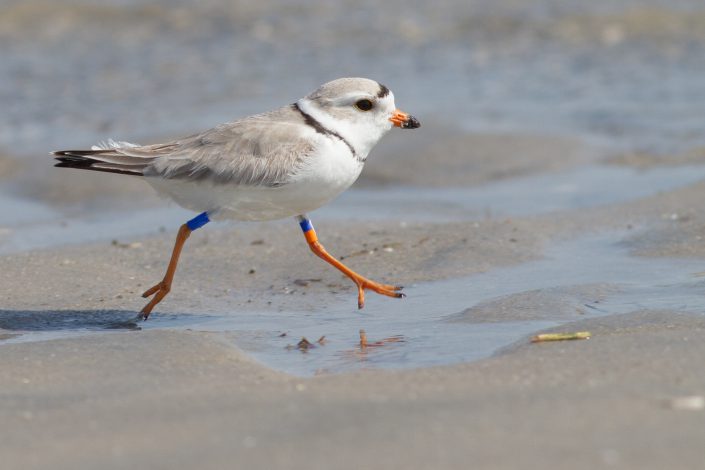Beachnester Buzz: Meet Bob, Avalon’s “Famed” Piping Plover
NEW, WEEKLY UPDATES FROM NEW JERSEY’S BEACH NESTING BIRD PROJECT TEAM
by Todd Pover, Beach Nesting Bird Project Manager

Meet Bob. He is a piping plover who received this nickname while being banded by CWF Wildlife Biologist Emily Heiser in 2012 as part of a SUNY-ESF research project in New Jersey. This past weekend was a big day for Bob. Three of his chicks reached the fledgling state – this milestone of flight is the metric for a successful breeding season.
Things have not always gone so well for Bob. In 2012 his mate was killed by a predator and he couldn’t incubate their eggs alone, so the nest was abandoned and he didn’t find a new mate. In 2013 Bob and his new mate (Kelly) were down to their last remaining chick when a ghost crab snatched and dragged it down its burrow. We dug the chick out, but it died soon after in rehab. In 2014 Bob and Kelly’s chicks died quickly at the hands of an unknown predator. In 2015 a nest camera painfully showed Bob’s chicks being eaten by a fox just after they hatched and were still lying in the nest bowl.
Flash forward to this year and Bob was part of the last piping plover pair left nesting in Avalon, once a thriving breeding site with as many as eight pairs. His long-time mate Kelly left him for another male at Stone Harbor Point, but he found a new mate and finally they have met success. Given all that has happened to Bob, you can see why we are happy for him (and Emily) today!
Sadly, this five year “drama” is not an especially unusual story for piping plovers. Their existence, especially here in New Jersey, is seemingly “against all odds”. In addition to the predators, they face a multitude of threats, direct and indirect, such as human disturbance as a result of heavy recreational use of beaches, habitat loss and degradation, and flooding, to name a few. Each year CWF and a host of partners throughout coastal New Jersey mount an extensive effort to protect piping plovers and other endangered beach nesting birds such as least terns and black skimmers. Without this active protection and management these birds would probably disappear from most of our state’s beaches.
LEARN MORE
- Conserve Wildlife Foundation Beach Nesting Bird Project
- Conserve Wildlife Foundation Field Guide: Piping Plover
Discover more from Conserve Wildlife Foundation of NJ
Subscribe to get the latest posts sent to your email.